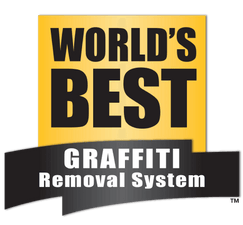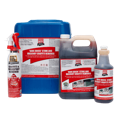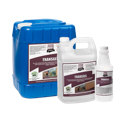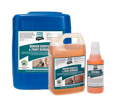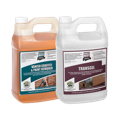Removing Graffiti and Overspray from Concrete, Block Walls and Pavers
To remove graffiti and overspray from concrete or block walls, use our Bare Brick, Stone & Masonry Graffiti Remover (BBSM).
For typical graffiti, apply three flood coats (with roughly 3-minute intervals between coats), then wait a few more minutes before rinsing with a small pressure washer.
Agitation while applying this product can greatly assist in the removal process. Continued experience with the product will enable users to judge how much dwell time and number of applications are required for different surfaces and particular spray paints. Patience is key, especially with older or thicker graffiti. It's important to keep the graffiti wet with the product for as long as possible before rinsing.
For certain inks/dyes and specific spray paints (especially reds), Feltpen Fadeout may be necessary to achieve quick and flawless results.
Please refer to the Technical Data Sheets (TDS) for more detailed instructions or feel free to contact us for expert advice before starting your job.
Note: Depending on the specific requirements of the job, Heritage Graffiti Remover or Vanish Graffiti & Paint Remover can be used interchangeably with Bare Brick, Stone & Masonry Graffiti Remover. To address any remaining shadows left from spray paints after using removers or solvents, please follow the provided link for further instructions.
Removing Paint, Paint Spills and Line Stripes from Concrete
As a general rule in paint removal, we recommend using a thicker remover for thick paints and a thinner remover for thin paints, including spray paint, that penetrate porous substrates and dissolve them from the font as well as behind.
To remove spray paints, latex, acrylic, and overspray, you can use either Bare Brick Stone & Masonry Graffiti Remover or Vanish Graffiti and Paint Remover. Extra coats and/or extended dwell times may be needed to achieve perfect results on thicker or older paints.
For removing thicker, dried-out paint, paint spills, or line stripes from concrete, we typically use Transgel Paint & Graffiti Remover, which can be applied by brush, broom, or sprayed with an airless paint sprayer. Apply it thickly and leave it on for as long as needed. This can range from 30 minutes to hours or even overnight—before rinsing with a pressure washer. For larger jobs involving thicker or older paints, a hot water pressure washer is extremely beneficial.
When removing paint spills on concrete or pavers, it's best to first remove any thickness or damp/undried paint using scrapers, rags, or similar tools. Never start pressure washing wet latex paint spills. You will turn a a few square feet of paint into a thousand square feet of mess!
Apply Transgel thickly, or alternatively, apply Vanish several times using a soft nylon broom, agitating as you apply. Allow the remover to dwell for as long as needed, then rinse with a pressure washer.
Please Note: As with all paint removal jobs, it's ideal to first test out your removers and techniques before attempting larger-scale applications.
Transgel Paint & Graffiti Remover has proven most effective at removing line stripes from asphalt and concrete. In fact, we have seen up to 5 miles of lines removed on a road and many line stripes and other painted signs removed from concrete parking structures. Typically, Transgel is applied by brush or sprayed with an airless paint sprayer and left to dwell for as long as needed before rinsing with a pressure washer.
Vanish Paint and Graffiti Remover can be extremely helpful for removing thinner remnants of paints, especially on mortar joints, natural stone and exposed aggregate surfaces.
In many cases, using both Transgel and Vanish yields the best results. When removing paint from concrete or block walls with mortar joints, as well as other brick, stone, or masonry substrates, Transgel is often required to remove thicker layers, while Vanish can effectively dissolve thinner remnants in nooks and crannies.
Occasionally, when cleaning concrete, an acidic cleaner may be needed for the final removal of mineral stains (titanium dioxide) left in concrete after using the products listed above.
Please note: Our products are NOT designed for the removal of thick thermoplastic paints. Typically, this is achieved through abrasive blasting with sand and/or extreme high pressure water.
Removing Graffiti, Road Markings or Glyphs from Asphalt
When removing typical spray paint graffiti from asphalt or road markings and glyphs, Bare Brick, Stone & Masonry Graffiti Remover can be applied by brooming it onto the road surface (i.e., applying 3 coats at roughly 3-minute intervals), then rinsed away with a pressure washer. This method usually achieves the desired results quickly and easily.
All asphalt, or tarmac, is black and composed of bituminous oils and aggregate. When the aggregate stones are mixed with hot asphalt cement, the resulting mass becomes black. Over time, as the asphalt oxidizes, the coating on the aggregate breaks down, revealing the color of the aggregate beneath. This can result in a grayish appearance if the asphalt plant used a light-colored aggregate. On most road surfaces like this it is fine to use Bare Brick, Stone & Masonry Graffiti Removerwithout any visible signs of damage or degradation.
However, some caution should be taken, particularly on newer blacktop roads where extended dwell times with the product can lead to the breakdown of bituminous oils in asphalt, similar to a diesel spill. This can result in runoff water turning black and dirty, necessitating responsible collection and disposal.
For this reason, we recommend using Transgel Paint and Graffiti Remover. Transgel is pH neutral and can be left on for longer periods without degrading asphalt or releasing bituminous oils when pressure washing. Apply Transgel thickly by brushing or spraying with an airless sprayer, and allow some dwell time (at least 10-30 minutes) before rinsing off with a pressure washer.
Transgel has also proven highly effective on dried-out, thicker, older white, pale blue, and yellow spray paints on asphalt. It can be left on for as long as needed to crinkle and soften them, facilitating removal with a pressure washer.
For larger jobs on asphalt, a quick alternative to removing paint or graffiti is to paint over the road using black road paint, available from commercial paint stores, as illustrated in the photos below.
After removing graffiti from the sound wall, this city decided to paint over the graffiti that was left on the asphalt road.
Removing Paint Spills and Line Stripes from Asphalt
To remove thicker paints from asphalt such as paint spills and line stripes, apply Transgel Paint and Graffiti Remover thickly and leave on as long as needed. As always, test a small section first, before attempting large scale removals.
For larger removal jobs or when dealing with older, thicker drips, a hot water pressure washer can be extremely useful. When addressing paint spills, it's best to first remove any thickness or damp/undried paint using scrapers, rags, or similar tools. It's crucial to avoid pressure washing wet latex paints on a road, as this can spread the paint over a much larger area, turning a small area of paint into a huge mess.
Latex paint pens and spills are commonly removed on driveways and roads. Sometimes, a rotating power nozzle in conjunction with HOT water can efficiently remove large areas of latex/emulsion/acrylic paints.
Hot water at pressure can be extremely useful at removing most graffiti made with acrylic or oil-based paint pens, especially when they have been 'softened' with our removers first.
3 gOLDEN RULES
1) If graffiti is not coming off easily, you're doing it wrong. You may require a change of tact or use of another product.
2) If you can't remove a little bit of graffiti, then you're not going remove a lot. TEST FIRST before applying product to an entire job. This way you can determine if you’re on the right track before embarking on full scale removals.
3) If you're working hard, you're doing it wrong. Forget the scrubbing, blasting and any other abrasive measures. Put simply, either your products are working or they’re not. Any problems can be taken care of with the right technique.
rEMOVING gRAFFITI FROM SKATEPARK
Removing graffiti from concrete skate parks can be done quickly and perfectly using our products. we have seen many skate parks fully restored to bare concrete after years of neglect and multiple paint overs. View Skate Park demo gallery here.
Once a skate park has been cleaned you can greatly minimize the ongoing burden of graffiti removal in the concrete bowl by sealing with 4G Surface Guard FLOORS which makes them far easier to clean without risking damage.
For vertical concrete walls in the skate park apply World's Best Graffiti Coating to make graffiti easily removable with hot water alone!
rEMOVING Paint from walkway
rEMOVING Parking Lot Stripes
Andy and his team at Super Power Wash applied Transgel Paint Remover, allowed it to dwell for 3 hours, and then easily washed it away.
Expert Advice
Click on any of the icons below for how-tos & more
